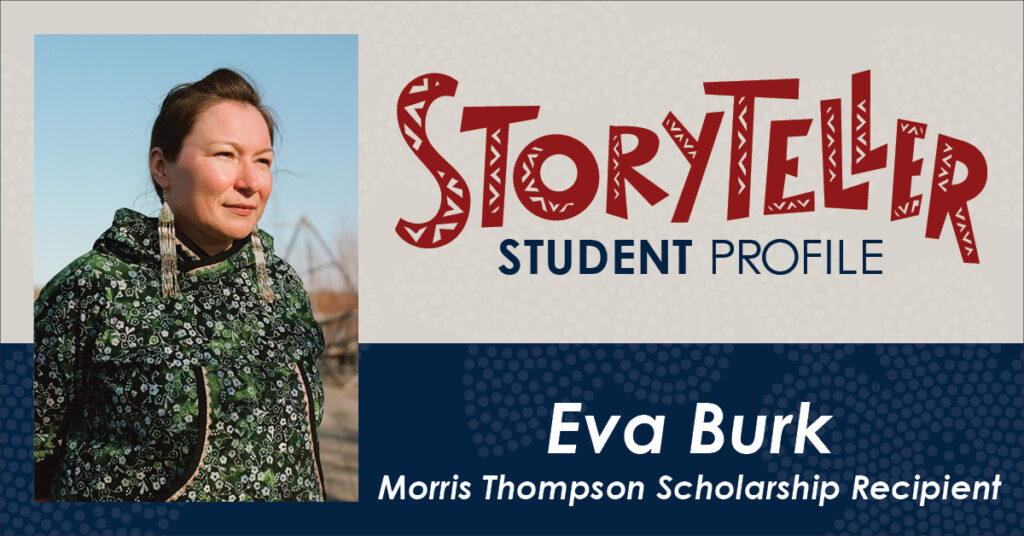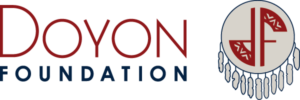
Eva Dawn Burk writes: Sedelnekkaa Dim yel Joy Burk heelaanh, Toghotthele hut’aane eslaanh. My parents are Dim and Joy Burk, from Nenana. Setsoo, eenaa’e baanh, eesee Barbara Roberts gheelaa’ee, Rockland, Michigan hut’aane eslaanh. My mother’s mother was the late Barbara Roberts from Rockland, Michigan. Setsoo, eetaa’e baanh, eesee Lina Olin yel Elvie Burk gheelaa’ee, Kokrines hut’aane eslaanh. Setseye, eetaa’e baanh, eesee Billy Burk gheelaa’ee, Toghotthele hut’aane eslaanh. My father’s mothers were the late Lina Olin and Elvie Burk from Kokrines. My father’s father was the late Billy Burk from Nenana.
A University of Alaska Fairbanks (UAF) student, Eva is pursuing a Master of Science degree in natural resources and environment. She was born in Toghotthele (Nenana) and lives in Fairbanks. Eva attends UAF with help from Doyon Foundation’s Morris Thompson scholarship, named for the former president and chief executive officer of Doyon, Limited. She is scheduled to graduate in December 2022.
Doyon Foundation: Tell us about your commitment to natural resources education and ways that it can help people achieve a healthy future. What led you to pursue a degree in this area?
Eva Dawn Burk: I’m using my engineering background and natural resources education to assist tribes and corporations with investigating clean water, food and energy solutions. I envision a healthy future for my family and community, defined by sharing food and culture.
The collective health and wellbeing of Indigenous people lies in their ability and access to realize their role as the original stewards of the land. Healing through food and culture takes place through reconnecting – through strengthening relationships with one another and with the land, waters, plants and animals.
DF: You favor a holistic view to revitalizing Indigenous food systems.
EDB: Yes. Revitalizing directly benefits health, economies, education and tribal sovereignty. Because a holistic approach is needed to ensure sustainability of traditional and local foods for future generations, there’s also a need for local to global collaboration and cooperation. Climate change, current natural resource management structures, and contemporary lifestyles threaten the sustainability of traditional foods and the knowledge required to harvest and process them.
Many of our people, especially youth, are struggling to remember “who they are and where they come from.” This connection is what Elders say is important to wellbeing. The future we are building centers around healing, food and culture.
DF: You emphasize the importance of incorporating all the senses in education. Why does this matter?
EDB: Bringing people together around foods creates space for other connections, such as language, art, song, dance and storytelling. Using traditional storytelling practices and modern technology and media to share experiences such as felt impacts of climate change to traditional foods can fuel momentum and collective action.
DF: Congratulations as you look ahead to earning your master’s degree. How has receiving the Morris Thompson scholarship helped you reach your goals?
EDB: Doyon Foundation provided support critical to helping me graduate this year. Without this financial backing, it would be extremely difficult to balance family, work, graduate studies and the community engagement necessary for effective research.
For instance, scholarship help permitted me to work in our communities to strengthen our food systems, which requires a lot of education and outreach, including presentations, workshops and training. Doyon Foundation is directly investing in our communities through supporting me in my educational journey.
This scholarship allows me to be successful in my graduate program, both academically and socially, so that I may bring my whole self to the university. I’m excited to participate in groups such as the American Indian Science and Engineering Society (AISES) and the Alaska Native Science and Engineering Program (ANSEP). I’m dedicated to helping other Indigenous students explore educational and career opportunities in the science technology engineering and mathematics (STEM) fields.
DF: When you encourage Indigenous students interested in STEM fields, how do you remember your own challenges? How did you overcome them?
EDB: I recall an echo I began hearing in my head: “Don’t forget where you come from. Go. Go get your education and come home. Help your people.” I trusted my intuition. I gave up a comfortable lifestyle that left me with little connection to my true self, my people, land or culture. But what I lost in salary, I made up in knowledge and connection.
I acknowledge my privilege. I am fortunate to be earning a master’s degree and holding leadership roles. It is through these experiences I learned the value of hard work, importance of community, and the influence of a dollar. I’ve also learned how to heal, how to reconnect with my land, culture and people.
DF: What advice have you been given that you’d like others to benefit from too?
EDB: An Elder reminded me the only job I have is to be well. My friends remind me the most radical thing I can do is raise strong, healthy children rooted in their culture. That advice reminds me that success and wellbeing are one in the same.
To keep myself grounded, I spend time with Elders and youth, reviving our traditions around food, song, dance, art, language, and most important, love and respect for one another.
DF: Graduates in your field are prepared for a wide range of management and administrative careers. How is the Morris Thompson scholarship helping to shape your goals?
EDB: This scholarship is essential for completing my educational goals in natural resource management planning. I’m investigating sustainable community development in rural Alaska, focusing on the human dimensions of capital, including social, intellectual, experiential and cultural.
The scholarship is supporting much-needed research for me to successfully defend my thesis for graduation. With scholarship help, I also completed courses in Geographic Information Systems (GIS) mapping and data analysis. GIS is especially helpful for managing natural resources and is a powerful tool for long-term planning.
I work closely with tribes, corporations and nonprofits to advance our technical capacity and self-reliance by helping youth and Elders develop culturally relevant shareholder development programs that incorporate traditional activities into education, training and career counseling opportunities.
DF: You already have some of these efforts under way. How are they going?
EDB: I’m working with tribal members to explore opportunities for building sustainable food, energy and water systems. As tribal members, landowners and corporate shareholders, we have unique opportunities to manage our own natural resources. We can develop projects that sustain communities, socially, economically and environmentally.
I have mentors from across Alaska who are Elders, tribal chiefs, village council representatives, corporate CEOs and board members. From these mentors, I will develop a comprehensive understanding of what it takes to start an educational center with programs for all ages to gain hands-on skills. I also volunteer my time to learn from Indigenous knowledge holders, form collaborative partnerships, and seek resources to sustain these learning spaces dedicated to intergenerational healing through food and culture.
DF: Based on your activities and research, what do you think it will take to realize the future you envision?
EDB: To help facilitate change, I host community gatherings around revitalizing Indigenous food systems, with intergenerational learning in a natural environment, free of technological interference.
Using all of the senses to learn – taste, touch, smell, sound and sight – provides an experience that speaks to the heart and motivates others to pursue healing through connecting to the lands and waters that sustain us. I strongly believe that one small change, whether individual or collective, can ignite a blazing path of change.
Named in honor of the late Morris Thompson, former president and CEO of Doyon, Limited, the Morris Thompson scholarship, awarded by Doyon Foundation, has helped more than 200 students forward their education. The annual Morris Thompson Memorial Golf Classic raises money for this competitive scholarship fund. This year’s event takes place June 23 – 24 in Fairbanks. There are opportunities to support the golf classic as a sponsor or volunteer; learn more and sign up at doyonfoundation.com/mtmgc.
You may also support the scholarship fund by making a secure online donation on our website or by mailing a check to Doyon Foundation, 615 Bidwill Ave., Suite 101, Fairbanks, Alaska 99701. To direct your donation to the Morris Thompson scholarship fund, simply note “Morris Thompson scholarship fund” in the notes section of the online form or on the memo line of your check. Thank you for supporting our students!
